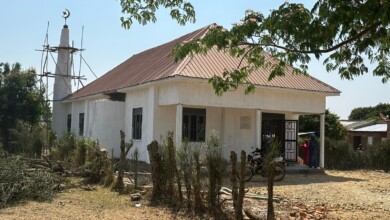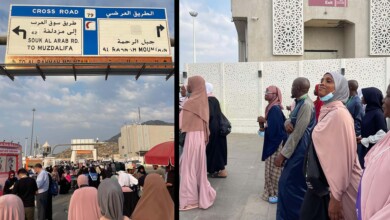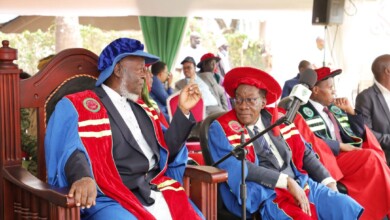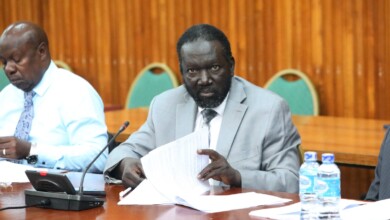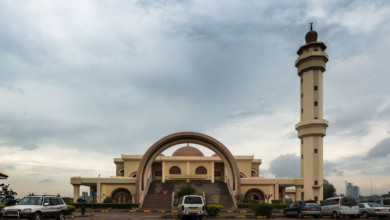Sheikh AbdulQadir Mbogo: A life of faith, service and leadership
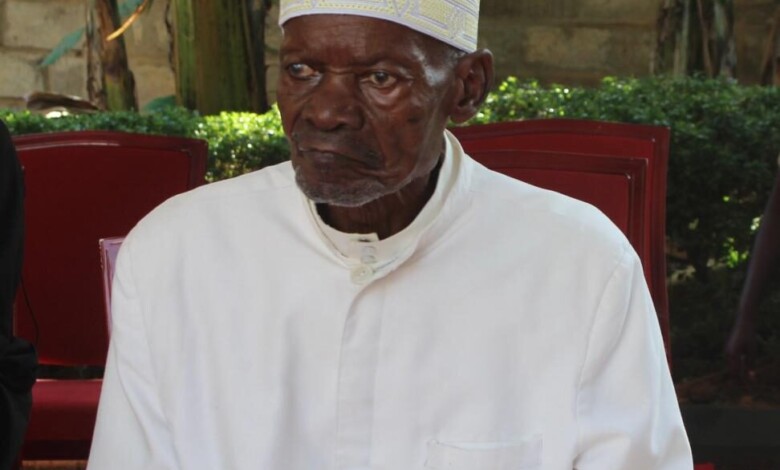
By Najma Salim
Sheikh AbdulQadir Mbogo sits quietly in one of the velvety green chairs in his home in Kiwanga, Mukono District Uganda. His crisp white Kanzu, traditional to Muslims is complemented by a red and white keffiyeh headdress draped around his neck, a subtle yet meaningful touch to his appearance.
Beside him, his wife, Hawa Nalukenge sits on a mat, ever attentive to his needs. At 94 years old, Sheikh Mbogo’s memory has faded, partly due to old age, yet everything around him speaks volumes about his commitment to Allah and the remarkable life he has led. Take for example, the dua he leads us into the moment we enter his home.
Directly across from his house stands the Kiwanga Uganda Muslim Education Association (UMEA) School, which Sheikh Mbogo founded decades ago, a contribution to the education in his community.
As he ages, Sheikh Mbogo continues to leave behind a permanent mark. He has authored a book, Ebyafaayo by’Obusiraamu, a book in which his experiences with the Muslim Community and the Uganda Muslim Supreme Council (UMSC) which he has been a part of since inception live on. In this interview, we explore his contributions and hopes for the future of Uganda’s Islamic community.
A life of service
Born on March 13, 1930, Sheikh Mbogo’s life of service to the Muslim community spans over seven decades. He began his journey in 1951, shortly after returning from Yemen, where he had studied and deepened his understanding of Islam. His first role was as the Imam of Abdul-Azziz Bulwadda Mosque in Kampala.
His leadership skills were soon recognised, and he later became the Chief Khadi of Kampala District, a position that brought him into closer contact with the leadership of the Uganda Muslim Supreme Council.
Unity and integrity
Among his dignifying achievements working with the UMSC is pioneering the establishment of Kibuli Hospital in 1982, Uganda’s first Muslim hospital, with a 250-bed capacity.
The hospital was built on land donated by Prince Badru Kakungulu in the 1930s. The project united Muslims from across Uganda, under a common goal. Sheikh Mbogo recalls that the fundraising effort was a nationwide venture, with donations coming from individuals and communities across the Muslim fraternity.
However, he was not alone in this endeavour. He was supported by influential figures such as Hajj Katerega Namuguzi, Hajj Eriasa Sevviiri, Sheikh Muhammad Kibanga, and Hajj Lulagala. He also acknowledges the contribution of Minister Ntege Lubwama, who provided essential building materials, including asbestos roofing sheets.
Once the foundation of the hospital was laid, Sheikh Mbogo’s leadership was put to the test. There were multiple iron sheets left. He recalls organising the return of leftover asbestos sheets, but the Minister directed that they could be sold, with the proceeds directed toward continuing the hospital’s construction.
Mbogo’s small act of integrity is a powerful illustration of the values of transparency, honesty, and the principle of doing good for the sake of Allah.
The Kibuli Hospital project was opened in 1955 with funds entirely raised within Uganda. This achievement stands as a testament to the strength and unity of the Muslim community.
Reflecting on the Quranic verse from Surah Ar-Rahman (55:60), “Is the reward for good (anything) but good?”
For his work, Sheikh Mbogo’s life embodies the truth of this verse. His commitment to ethical leadership has earned him the respect of his peers and has paved the way for his family’s continued success.
His son, Jawad Mbogo testifies to how his father’s legacy has opened doors in his work, where upon mention of his father’s name, people are receptive to being of assistance to him.
Leadership and mentorship
For Sheikh Mbogo, good leadership is not only about personal achievement but about the sustainability of future leaders. He recommends that current leaders take it upon themselves to mentor their successors, rather than fearing or sidelining potential leaders.
Drawing inspiration from the Quranic story of Khidr and his mentorship of Prophet Musa (as described in Surah Al-Kahf, 18:60-82), Sheikh Mbogo hopes that mentorship will become a cornerstone of leadership within the UMSC, ensuring the transfer of wisdom and responsibility to future generations.
Mbogo has fond memory of when Sheikh Kassim Mulumba, Chief Khadi at the UMSC entrusted him with presenting at a meeting of world Muslim leaders in Egypt.
Sheikh Mbogo echoes that giving people opportunities to grow, travel, represent the association leaves a mark on them, and makes them strive for growth.
Challenges within the community
Despite the many accomplishments of the Muslim community in Uganda, Sheikh Mbogo remains deeply concerned about ongoing divisions within the community.
He notes that these divisions are not easy to resolve, as some individuals benefit from them using it as a chance to sell property or take wrongful ownership of it.
As a vision for the future, Sheikh Mbogo hopes that the UMSC will consider the creation of a retirement plan for those who have served in leadership roles.
He also envisions a future where the leadership of the Muslim community in Uganda is marked by integrity, unity, and a deep commitment to serving the needs of the people.


